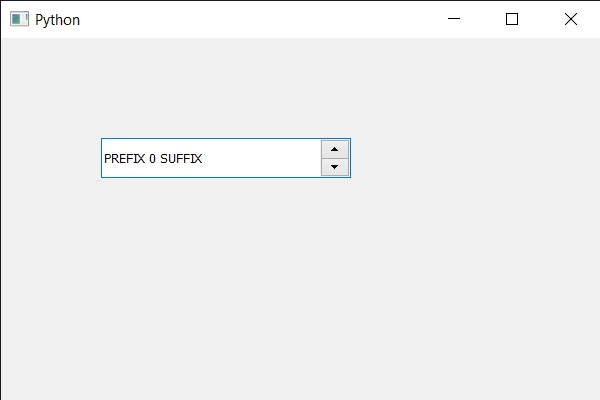En este artículo veremos cómo podemos establecer la sugerencia de estilo del texto del cuadro de número. El algoritmo de coincidencia de fuentes utiliza sugerencias de estilo para encontrar una familia predeterminada adecuada si una familia de fuentes seleccionada no está disponible. Hay muchas sugerencias de estilos que ofrece el cuadro de número como AnyStyle, SansSerif, Times, etc.
Para hacer esto, usamos el método setStyleHint con el objeto QFont del cuadro de número.
Sintaxis: font.setStyleHint(style_hint, style_preference)
Argumento: toma la sugerencia de estilo como argumento y el segundo argumento es opcional, que es la preferencia
Retorno: devuelve Ninguno
A continuación se muestra la implementación.
Python3
# importing libraries
from PyQt5.QtWidgets import *
from PyQt5 import QtCore, QtGui
from PyQt5.QtGui import *
from PyQt5.QtCore import *
import sys
class Window(QMainWindow):
def __init__(self):
super().__init__()
# setting title
self.setWindowTitle("Python ")
# setting geometry
self.setGeometry(100, 100, 600, 400)
# calling method
self.UiComponents()
# showing all the widgets
self.show()
# method for widgets
def UiComponents(self):
# creating spin box
self.spin = QSpinBox(self)
# setting geometry to spin box
self.spin.setGeometry(100, 100, 250, 40)
# setting range to the spin box
self.spin.setRange(0, 999999)
# setting prefix to spin
self.spin.setPrefix("PREFIX ")
# setting suffix to spin
self.spin.setSuffix(" SUFFIX")
# getting font of the spin box
font = self.spin.font()
# setting style Hint
font.setStyleHint(QFont.Serif, QFont.PreferOutline)
# reassigning this font to the spin box
self.spin.setFont(font)
# create pyqt5 app
App = QApplication(sys.argv)
# create the instance of our Window
window = Window()
# start the app
sys.exit(App.exec())
Producción :

Publicación traducida automáticamente
Artículo escrito por rakshitarora y traducido por Barcelona Geeks. The original can be accessed here. Licence: CCBY-SA